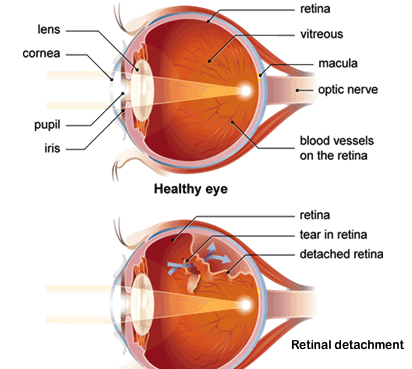Retinal Detachment
 RETINAL DETACHMENT can occur when the thin lining at the back of the eye called the retina begins to pull away from the blood vessels that supply it with oxygen and nutrients. Without prompt treatment it can lead to blindness in the affected eye. The retina may detach because it has holes in it which allow fluid to pass beneath it, causing separation from the underlying tissues. This may be compared with a wall-paper coming off the wall.
RETINAL DETACHMENT can occur when the thin lining at the back of the eye called the retina begins to pull away from the blood vessels that supply it with oxygen and nutrients. Without prompt treatment it can lead to blindness in the affected eye. The retina may detach because it has holes in it which allow fluid to pass beneath it, causing separation from the underlying tissues. This may be compared with a wall-paper coming off the wall.
What are the symptoms?
Warning signs are the sudden appearance of floaters, flashes of light in one eye, and blurred or distorted vision often obscured by a curtain or a shadow. Retinal detachment is commoner in myopia, after cataract surgery and after trauma.
What is the treatment?
Prompt surgical treatment should ensure that vision is preserved in the affected eye, and there are a number of types of surgery to suit individual cases. This is a relatively rare condition affecting just one 1:10,000 people in the UK each year. In 90% of cases only one operation is needed to reattach the retina. Surgical options include:
Vitrectomy involves removing the fluid from the inside of the eye and replacing it with either a gas or silicone bubble. This holds the retina in position from inside.
Scleral buckling involves stitching a fine bands of silicone rubber to the sclera (outside white of the eye), where the retina has detached. Laser or freezing treatment is then used to create scar tissue that sticks the detached retina around the hole.
Pneumatic retinopexy, for selected retinal detachments, involves injecting a small bubble of gas into the eye which presses the retina back into place and closes the retinal hole. Laser or freezing treatment, called cryopexy, around the holes is then used to create scar tissue that secures the retina in the correct position. The bubble acts as a support to hold the retina in position and over time normal body fluids will replace the gas.
Special precautions
Gas bubble in the eye will expand at high altitude, which can cause serious problems. Therefore, you must not travel by air until the gas is fully reabsorbed and you have had your final check by your retinal surgeon's team.
Outlook?
Retinal detachment surgery aims to prevent blindness and restore as much vision as possible. Some sight may have been lost already. Not all retinal detachments are the same. Some retinal detachments that are present for a long time or may be complex in nature and extent carry a less favorable prognosis. Outlook also depends on an individual's healing response after surgery.




